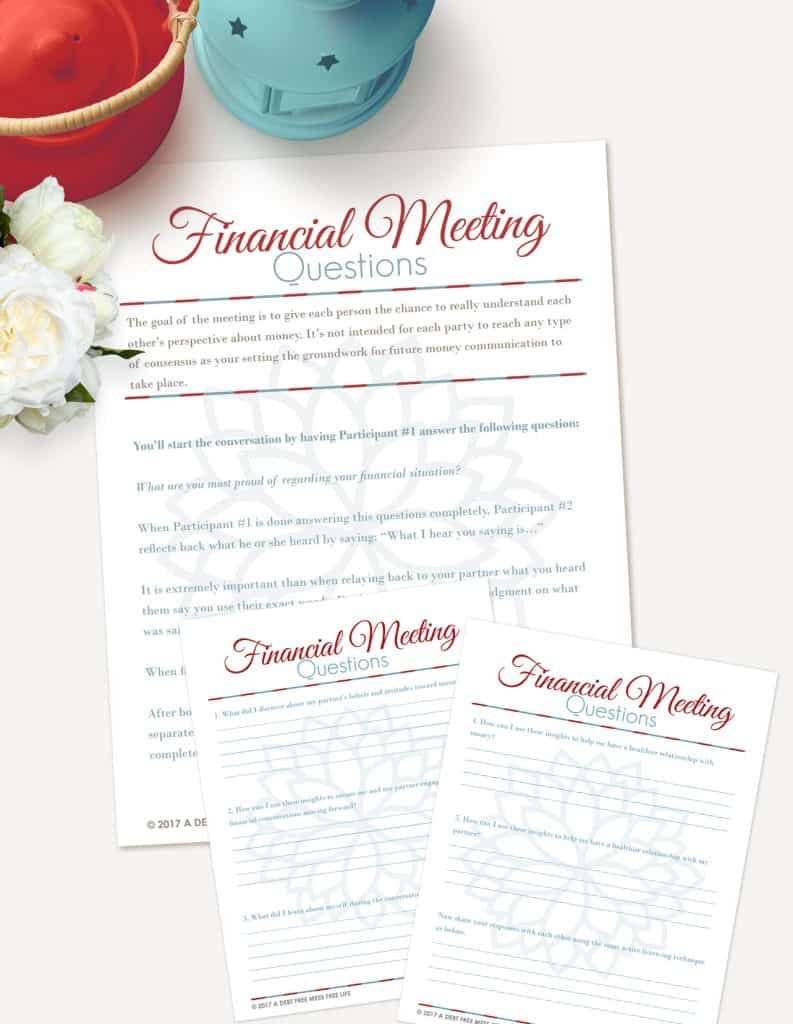A Mess Free Life may collect a share of sales or other compensation from the links on this page.
Money.
Just the word can make you cringe.
Unless you’ve recently won the lottery, you’re independently wealthy, or you live off a trust fund, money can be the source of a lot of stress in any marriage or joint living situation.
Even if you have your emergency fund and you’re saving for retirement, unexpected things happen that can significantly impact those funds and it’s a quick trip back to where you started from.

With money being a big source of stress, it can also be a big contributor to fights. In fact, fights about money are a leading cause of divorce.
They can lead to tension, frustration, and create distance between you and the person you love most.
This usually happens when you both have different ideas about how to save and how to spend.
But even if you’re in agreement, fights can still arise and they usually come out of nowhere.
It’s best to be proactive and work to keep the fights from starting before they even begin.
So let’s take a look at these two personality types and see if you can recognize yourself in one of them:
Table of Contents
THE SPENDER
Whether you’re a shopaholic or just like the comfort and satisfaction of knowing that you can buy whatever you need whenever you want it and you’re comfortable opening your wallet you’re probably a spender.
Maybe you’ve always had a habit of just “running out” or logging on to buy what you need at the moment you need it. You don’t make a plan for when you’ll make the purchase, you don’t shop around for the best price, you just go and get it.
This creates a sense of comfort and security knowing you’re always able to get what you need.
It may also leave you feeling independent, not asking for permission to buy, just getting whatever goods or services you need when you feel like it.
You’re a grown up after all, you’ve earned the money, why shouldn’t you just be able to spend it?
THE SAVER
The saver has sometimes been called a “hoarder” or a “cheapskate.”
Terms like frugal and thrifty come to mind.
The saver is usually more comfortable when there’s money in the bank and the credit cards are paid off.
They don’t spend quite as easily. They prefer to shop around and they often ask themselves “do I really need this” before making a purchase.
Which usually keeps them from spending. They believe money is precious and should be handled with care and respect.
The saver usually doesn’t understand why it might be nice to go out to dinner when there’s plenty of food in the fridge.
They may feel like they don’t need to buy something new when used will work just fine.
They often try to figure out how to fix or make something themselves instead of hiring someone for the job.
When these two personalities come together, a fight is bound to happen as their ideas clearly clash with each other.
That’s why the very first step in overcoming money problems should be to talk to each other about how you feel. But when you do, make sure you’re listening with an open heart and an open mind. Remember that you love each other after all.
Your spouse’s money personality is not personal. They aren’t trying to aggravate and annoy you with their habits, it’s just who they are. They were probably raised with those habits and learned them early on.
You need to be able to understand where the other is coming from so that you can start to work together instead of against each other. Your family’s needs are more important than your individual desires.
Now that you have a better understanding of your spouse’s money personality, it’s time to work together toward the same goal.
HOW TO START WORKING TOGETHER
Create your budget and balance your checkbook together – this way you’ll both be on the same page as to what you’re saving for, how you can spend, and where your money is going.
You can also start to plan for any big purchases coming up like a family vacation or a new car.
SET LIMITS
The spender will want a little flexibility to feel secure so create a “free-spending limit.” No questions asked, no judgment, no fights, you can each spend up to a set amount without permission. And that spending limit is per week or per month so you can spend up to it before having to talk about additional purchases.
AUTOMATE
Making your bill pay and savings automatic will help to reduce the stress of constant discussions. Set up bill pay with your bank and pay all of your monthly bills automatically. Schedule an automatic transfer into your savings account once a month or once per paycheck to make sure you have money set aside. This will help the saver feel secure.
SPEAK FROM THE HEART
The only way to get past the fights is to speak openly. Use “I” statements so you don’t make your spouse feel like they’re being attacked. Instead of “You never pay the bills on time” try “I get frustrated and scared when the bills aren’t paid on time. How can I help fix that?” This will let your partner know that you want to be a team and they are not being blamed.
If you want a step by step solution to help with the fights join our Private Resource and Online Community and get instant access to this bundle and many other resources found in the Free Resource Library. The first step is to get access to the Free Resource Library. Once there you’ll get a special invite for our free community!
The Family Budgeting and Finance Resource Bundle is the perfect solution to help your family work together to improve your financial situation. Whether you’re trying to pay off debt, save for something important to the family or learn to shop with purpose, these tools will help your family reach their money goals!
THE FAMILY BUDGETING AND FINANCE BUNDLE INCLUDES:
A. The Financial Meeting Listening and Learning Worksheets – If you’re married or in a relationship where you’re sharing expenses but you know you’re both not on the same page, this worksheet will help you start to learn how your significant other feels about money. Often times when we sit down to discuss money with our partner, we end up in a fight because we can’t see eye to eye. Not much can be accomplished when this happens because when you’re fighting, you’re not listening. This tool helps both parties start engaging in active listening so they can finally get in line with one another, become a unified force and start fixing their finances together!
B. The Family Meeting Bundle – The family meeting bundle is the perfect solution to help your family get on the same page about anything! The four worksheets included in this bundle can be used not only for discussing important financial issues but to help the family work together and accomplish their goals.
- The Agenda Items for Discussion Form
- The Agenda and Notes Form
- The Decision and Outcomes Form
- The Family Meeting Rules Print
Plus. the 18-page companion document which walks you through the step by step process in completing financial and family meetings.
C. Expense Tracker – You’re out and about and you stop and make a few purchases. Days later when you check your bank balance you are surprised because it’s less than you thought it would be. Here’s the fix! Our beautifully laid out Expense Tracker page is designed to help keep track of all those expenses you don’t want to forget. Perfect if you’re trying to gain more control over your spending too! Use it whether you pay cash for all your purchases or pay via debit/credit. Never lose track of a purchase again.
D. Monthly Spending Plan Worksheets – The basis of every good budget is the ability to be flexible and responsive to the ever-changing demands of our money. Using our Monthly Spending Plan assures you have the ability to tell your money where to go each month when creating your monthly spending strategy. Create a new plan each month and place in your budgeting binder or hang on your command center so it’s easily accessible.
Go here to see the bundle pack!
COMPROMISE
If the saver wants to save an extra $200 a month in retirement and the spender wants to spend $200 a month on date nights, compromise. Spend $100 a month to go out on a date and put the other $100 into savings. Then you both feel like you got something and gave something up for the other.
CONCLUSION
If you’ve been fighting about money, you won’t find the answer overnight. It will take some time of tweaking your budget, making compromises, and searching for the right formula that you can both live with. Just know that your end goal is to stop fighting and continue to approach each other with that in mind.





